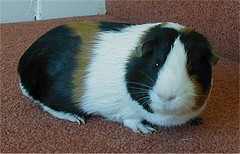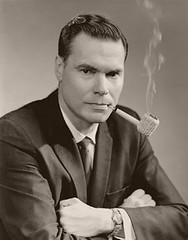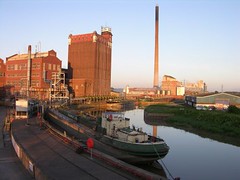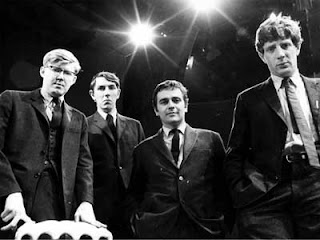Beckett fact no. 82.
Ten Irish Poets in Beckett, as mentioned in 'Andrew Belis''s 'Recent Irish Poetry' (1934).

1) Pamela Travers. Australian by birth, and an assitant to AE. Creator of Mary Poppins.
2) F.R. Higgins. Hearty 'smell of dung' notwithstanding, this victim of the antiquarian 'centrifugal daemon' features, like Austin Clarke, largely as a convenient punchbag, as he does in the introduction to Paul Muldoon's 1986
Faber Book of Contemporary Irish Poetry, in which we find him chastizing Louis MacNeice for failing to attend to the 'blood-music that brings the racial character to mind.' Which makes it ironic that he received such an unabashed sectarian savaging from Patrick Kavanagh for the crime of being an Irish Protestant with the temerity to write about Catholic peasants, and odd too that post-avant-friendly Keith Tuma has recently been anthologising him with something approaching zeal.
3) Geoffrey Taylor, praised for
The Withering of the Fig-Leaf and
It Was Not Jones, published under the name Geoffrey Phipps and the pseudonym R. Fitzurse respectively. He dropped the family name Phipps on being disinherited by his father for the crime of voting for Eamon de Valera. He was one of the two 'chaps' to whom Laura Riding bade goodbye (Robert Graves being the other) before she jumped out a window in Majorca and squashed her coccyx.
4) Cecil Salkeld, artist and future father-in-law of Brendan Behan, whose poundings on Beckett's door in Paris use up a few pages of Cronin's biography. Of Salkeld's poetry, Beckett wrote to MacGreevy in 1936 that he was 'immensely impressed by it'. Salkeld was a notoriously Oblomovian sluggard and bed-hogger.
5) Blanaid Salkeld, wife of the above. Author of
Hello Eternity! (1933),
The Fox's Covert (1935), and
... the engine is left running (1937). Beckett's praise for her work has prompted some small academic interest, though nothing on the scale of the Irish modernity cottage industry in Devlin/Coffey/MacGreevy studies.
6) Brian O'Higgins, aka Brian O hUiginn, aka Brian na Banban ('Brian of Ireland'). Author of
The Voice of Banba: Songs and Recitations for Young Ireland (1907): 'On, on with Irish Ireland; /Leave the Saxon mireland...' Neglected genius.
7) An Philibín, pen-name of John Hackett Pollock (1887-1964) (anything to
Watt’s Hunchy Hackett? We can but idly wonder.) Dublin doctor and founding member of Gate Theatre. Books include
Athens Aflame, The Secret Altar and
Grass of Parnassus. An Philibín is the Irish for plover.
8) Miss Large. Who the hell is Miss Large? J.C.C. Mays suggests in the
Field Day Anthology printing of 'Recent Irish Poetry' that this is a private sexual reference of Austin Clarke's, but he errs. She is D.M. Large, popular author of
Talk in the Townlands, The Cloney Carol and other verses etc.
9) John Lyle Donaghy. A Larne man, involved not very successfully in Dublin theatrical life, lived in Glencree and later London. His books are
At Dawn Above Aherlow (1926),
Ad Perennis Vitae Fontem (1928),
Primordia Caeca (1929),
The Flute Over the Valley: Antrim Song (1931),
The Blackird: Songs of Innis Fail (1933),
Into the Light and Other Poems (1934), and
Wilderness Songs (1942), if anyone fancies going and reading them. I did, and found them fair to middling, and a lot better than the abominable co-authored book that Coffey and Devlin published in 1930.
10) AE. Mentioned earlier in connection with Pamela Travers. Was known to scrutinize Beckett's submissions to The Irish Statesman for obscene acrostics, and receives some scurrilous from Beckett in his letters to MacGreevy. Miss Carridge in
Murphy reads his
The Candle of Vision, and Mr Case in
Watt his
Songs by the Way, except in French
Murphy Miss Carridge's reading tastes have subtly altered: there we find her reading Madame Rosa Caroline Mackworth Praed's
Roses de Décembre. So it goes in the world.
































